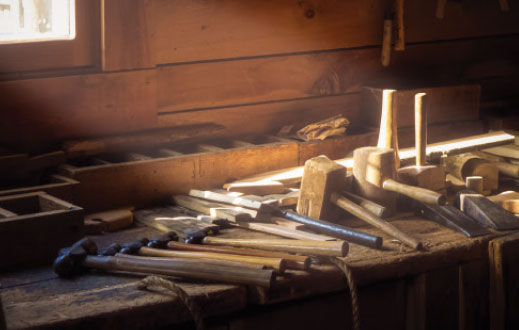Measure Twice, Cut Once
A man finishes a cedar hall closet, a wedding gift for his wife, but is the time he spends creating something perfect revealing something flawed?

Sam found him in the workshop, arranging the new tools on the shadow board—he’d put all the screws in and was now carefully drawing each shape in thick black marker. It felt satisfying lining them all up like this—vices, handsaw, clamps, even glue gun—but he still saw Sam roll her eyes.
“You know how you insist you’re not a perfectionist?” she said, grinning. “I think I’ll take a quick snap of that wall and load it up on your Facebook page.”
“I’m just getting everything in order before I start.” He stood back and looked at the outlines he’d drawn, ordered like instruments set out for a complicated surgery. “Like Dad used to say, a place for everything . . .”
“Please don’t quote your dad again. I just want to see you actually cut something and nail it together. Make something, Stewart. Make the cupboard!”
It was overdue all right, the piece he’d promised her. It had been meant to be a wedding present, then a first anniversary gift. Getting the house finished off and the workshop set up out here in the garage had soaked up the time, though. And he hadn’t wanted to put a single mark in those beautiful cedar lengths until he was absolutely ready. His father had saved that timber for years, up in the rafters of his own shed.
“That’ll be something for your new home one day, Stewie,” he’d always say, resting his hand on the lengths of timber. “A crib, maybe. A linen chest. Solid eastern red cedar with no knots—you just can’t get this stuff anymore.”
It was the first thing Stewart had taken down after the funeral, stowed and stacked it carefully in the back of his car under the boxes of cuff links and ties and tweed jackets and sweaters his tearful mother had insisted he take, things he couldn’t remember his father ever wearing, but still smelling just like him in the backseat as Stewart drove away, swallowing down his own scalding tears.
Mints, tobacco, sweat, wood shavings, and linseed oil; the smell of his father.
•
As soon as he’d finished his own workshop, Stewart had stacked them carefully inside on battens, his father’s ghost hovering, instructing.
Just sand these back and they’ll come up a treat. Never varnish cedar. Let the oils breathe.
Together, he and Sam had designed something that would do it justice. An old-fashioned cedar cupboard for the hall, where they could hang their wool coats and jackets. No shelves, no inset mirror, nothing showy; just a beautifully simple cupboard with brass hinges and some burnished vintage handles he would find from somewhere. Something old, that lots of hands had polished.
“I’m going to fit it together into panels and clamp it with glue,” he said now, sipping the coffee she’d brought him. “No nails. I’ll bevel the panel at the front and it’ll have piano hinges so the doors swing around to the sides.”
She smiled. “I know, I know. There’s a big space waiting for it in the hall. A wardrobe-sized space.”
“I don’t want to rush it.”
“Stewart, you’re not building a grand piano. It’s just a straightforward cupboard.”
“When this is finished,” he said, reaching over to give her a sideways hug, “it’ll be something you’ll want to leave our children, believe me. And you can—”
“Don’t tell me. You can’t buy cedar like this anymore, Son.” She was laughing, but her dead-accurate impression of his father was a bit unkind, he thought. He took down one of the chisels and selected one of the shorter lengths of timber, then carefully shaved a tiny curl from the end.
“Close your eyes,” he told her, “and smell this.”
He held the wood shaving under her nose, watching her hesitant smile as she shut her eyes reluctantly, her mouth making a tolerant half-smile. She had so much restless energy in her, his wife, but everything slowed down for a moment as she leaned into him and inhaled that scent.
“That is delicious,” she said finally.
He could imagine, clearly, the grain of the timber glowing in the afternoon sunshine in their hall, the rich lingering scent it would give their coats, a scent released as they pulled those coats in and out as seasons passed, all their busy footsteps down that hall.
“That’s what I mean,” he answered. “That’s an old, slow-growing tree, waiting for us to make something good.”
He could imagine, clearly, the grain of the timber glowing in the afternoon sunshine in their hall, the rich lingering scent it would give their coats, a scent released as they pulled those coats in and out as seasons passed, all their busy footsteps down that hall.
Sam was still leaning into him, her head resting on his chest. “I could buy you some aftershave with that fragrance,” she murmured. “Cologne. Woody scents are perfect for guys.”
•
Stewart did some research online. The right glues to use, the way to tenon and mortise the inside joints. Dovetailing—he loved that word. He changed his mind about the piano hinges and decided on inserting spring door closers to keep it all airtight if someone (a child? one of their children?) accidentally left one open, which would dissipate the interior aroma and its moth-repellent properties.
Kids, came his father’s voice. You know what they’re like. They’ll just grab their jackets and run down the hall and out the door. Go with the closers.
“How’s it all going?” Sam would say when he’d come in from the workshop at night to join her in front of the TV.
“Yeah, going well,” he’d answer, although truth be known, all he’d done was fuss with plans and drawings and dimensions, mixing up linseed and beeswax, experimenting with sandpapers. He checked and double-checked all his measurements and dimensions, but still, somehow, he couldn’t bring himself to set up the drop saw to cut that wood. Couldn’t risk ruining it, not when his father had kept it in trust for him for all those years. It still lay there in its perfect, unsullied lengths, aged and hardened, the grain running true through each piece.
Weeks passed as Stewart procrastinated.
“How’s the masterpiece coming along?” Sam began to say now, or even, “How’s the ark shaping up?”
Finally, he had to nerve himself to cut it. He imagined Sam’s ridicule if he backed out now. I waited two and a half years for my wedding present from Stewart, he could imagine her saying to their friends. And even then he got the bloody thing wrong. I should have asked for a hope chest. Or maybe a spice rack.
Well, some things were worth being painstaking about. She’d rushed the painting of the spare room, impatient with how long he’d been taking on the preparation, and look what had happened—streaks all along the cornices.
“Stewart, for god’s sake it doesn’t matter,” she’d flared, washing out the rollers with brisk efficiency. “We’ll be repainting anyway, hopefully, when we make it into a nursery, won’t we? Wasn’t that the plan?”
•
Stewart switched on the bench lamp and set the first length of cedar into the drop saw. He would trim each upright length perfectly to size and then handsaw the box dovetail joints for each corner using the miter box. He’d leave the interlocking halving joints until he felt a bit more confident. Make the pins and tails all visible at each corner, make it part of the cupboard’s aesthetic.
Take your time with the things that matter—you can’t fix it up later once you’ve cut it into pieces. Measure twice then cut once, no second chances.
“Measure twice, cut once,” he muttered to himself, positioning the lengths. Okay, yes, his dad’s mantra. Take your time with the things that matter—you can’t fix it up later once you’ve cut it into pieces. Measure twice then cut once, no second chances.
Ridiculous, though, the way his hands were shaking, as he paused before committing to the irrevocable spinning bite of the circular saw. The noise, as it cut, was a savage whine, and Stewart released the button to stop the engine the moment he was through. In the vibrating silence he looked down at his perfect cut and smelled the fresh, clean sharpness of cedar oil, stored and waiting half a century for this very moment. His heart thickened in his throat. It was going to be a miracle, this cupboard. It was going to be an heirloom.
•
“Stewart!” he heard Sam’s plaintive call from the back step. “Are you nearly finished? You’re missing MasterChef !”
The wedge cuts were taking forever to get right; the cedar being so hard and so prone to tiny splintering edges. Three sides were done, though, each tenon and mortise waiting for finishing.
“At last,” Sam said as he came into the house, pouring herself another glass of wine. “You’re in from the Man Cave.”
Stewart’s eyes glanced at the TV. Contestants he’d never seen before and had no wish to were piling up layers of cake and fruit into some elaborate, sure-to-topple dessert. He couldn’t see what Sam saw in the show.
“Well, sit down,” said Sam. Then: “Where are you going now? For god’s sakes.”
“I’ll be there in a minute,” he answered, going through to the bathroom. Inside the sliding glass cabinet, he remembered, there was a packet of emery boards, each one like the finest miniature sandpaper stick. Perfect. He didn’t know why he hadn’t thought of it before. He pulled the packet apart, hearing the audience groan as a dessert fell apart, feeling as if in his bones how each finely sanded cedar pin would fit into each tail in a tight wedge, the strongest bond in woodworking you could make.
She was on her fourth wine anyway, by the looks of it. She’d never notice. He slipped out again through the back door.
•
It soothed him, the counting and recounting of each step in the process, strung in exact order like beads.
Bang something quick and shoddy together by all means, he heard his father’s ghost say, but if you want it to be passed on to your children and your grandchildren, you have to take the time.
The only screws he used were for the door hinges. They swung open soundlessly, perfectly—then shut again, airtight and aligned, on the spring closers. It was a beautiful job. The scent of the cupboard made the workshop smell like a church—an incense he’d breathed in all autumn, absolutely contained and absorbed out here in the workshop.
Sam had soured on the project once he’d started spending a couple of hours every night out here—her mouth would twist into a grim little line each time he mentioned the workshop, like it was some lunatic hobby she had to endure of his, but Stewart noticed there was still the designated spot waiting hopefully in the hall. Their conversation seemed boiled down to its essentials these days, reduced to something utilitarian and rudimentary; there were no more expansive flights of impulsive planning on Sam’s part.
That was fair enough, though, Stewart thought as he worked. The house, after all, was pretty much finished and, three years into their marriage, he realized that he’d lost the need to keep winning her approval. He no longer feared her ridicule—he anticipated with pleasure, actually, her amazement when she finally saw the long-awaited gift in place.
She’ll come ’round, said his father’s voice reassuringly over his shoulder. Your mother was the same.
There was some truth in that, Stewart remembered. His parents’ conflicts took place under the surface, with his mother wearing an air of suppressed grievance you were meant to guess at. Sam’s sourness didn’t mean anything. She’d realize the point of his perfectionism when she saw the hall cupboard in place; when she opened it with astonishment and saw their coats and jackets lined up inside, moth free and aromatic when you pulled them on and smelled the clean, foresty scent of cedar. And when her friends, impressed, remarked on what a thing of beauty it was, she could cast herself, with wry humor, as the woodwork widow, as the wife of a man with a passion to do things right. It would all come back together, then, and this weird feeling that things weren’t quite aligned between them would vanish.
•
The night he finished it he said nothing, just slipped into bed beside her as usual. Lay there with his hands tingling from the last polish he’d given it before wrapping it in the drop sheet, as if it were a sculpture completed at last, waiting to be revealed.
The next day he came home from work early with a trolley he’d borrowed from his brother-in-law. He cushioned it with towels, propped open the back door, and gently wheeled the cupboard into place. It needed a tiny chock under the front corner—that would be their hall flooring, not the cupboard, the cupboard is absolutely 100 percent square in every angle, Stewie—then he hung their coats and jackets inside, one at a time, and gently closed the doors to wait for Sam.
•
Five o’clock came and went and he resisted texting her. She’d been putting in long hours at work lately and sometimes caught a later train. He put the trolley back in his car and the towels back in the linen press, conscious of how carefully, how conscientiously, he refolded them. At a quarter past six he heard her walking up the front path and took a last, quick, joyous glance at the cupboard.
Her key turned in the lock, then she was inside, taking him in, standing there. It shocked him, how expressionless her face was at the sight of him. Blank as a white, empty plate.
“Sam!” he said.
“Sorry,” she replied automatically. “Had a couple of drinks after work with the girls.”
“No, I mean, that’s fine . . .” said Stewart. “Happy anniversary, though. Better late than never, eh?”
He gestured toward the cupboard, his hands feeling oddly awkward. Stagy, somehow. Sam smiled. It wasn’t the smile he’d expected or anticipated—her face lighting up with bolts of delight and admiration—but she was tired. That was all it was.
“Hey,” she said. “Well, that’s beautiful, Stewart. It’s lovely.”
She moved toward the cupboard and opened the door, and he willed himself not to say anything, not dovetailed joints! or antique brass handles! or even so what do you think? He kept his mouth shut, and waited. She would lift her hand and run it along the inside wall, he thought. Tuck her fingers around the old, burnished handle. Lean in, and breathe the scent. Lean in.
Instead, she slipped her jacket off her shoulders, tucked it onto a spare hanger inside, and closed the door.
“Really lovely,” she said again.
Happy wedding, said the voice inside Stewart’s head, clamoring to be heard. Happy anniversary. Happy heirloom. All finished.
“Thanks, babe,” she said. Not as if she’d read his mind. More like a dutiful, distracted afterthought. Then she touched his arm absently and went into the kitchen, where Stewart heard the suck of the fridge door, the clink of a wine bottle.
•
Months later, when he opened the cedar cupboard to find its perfectly proportioned interior looking oddly empty and realizing half the coats inside were gone, namely Sam’s half, Stewart remembered this moment as he found himself fumbling with a similar numb, automatic gesture for his phone in his pocket.
He scrolled one-handed for her number while propping open the spring-loaded door with the other, his eyes on the empty space inside, reminded suddenly and unpleasantly of a coffin.
He found the text from her that just said “sorry” but rang anyway, feeling nausea rising. Whatever conversation they could muster now, surely, would be a jagged, misshapen mess, full of trailing foreshortened silences and snagged, grating interruptions. The splintery exchange of two people who’d lost the knack of hearing each other.
When she answered, though, she was polite and subdued—a Sam he barely recognized, though he had to admire her for how calmly she negotiated this ghastly, necessary conversation.
He summoned his own responses, consciously working to put the words together in the right order. From a stunned distance he heard himself forming sentences like it was a skill he’d acquired and forgotten.
It was so hard to concentrate as she spoke. Something kept slipping. He kept imagining her pushing her arms into the silk lining of her winter coat, so sweetly impregnated with cedar, her footsteps echoing crisply on the timber floor as she walked down the hall, tying the belt on her coat, stooping to pull up the handle of her suitcase—all these aching, fluid movements—and the door of the cupboard swinging perfectly, soundlessly shut behind her.
Santo, Vanuatu










